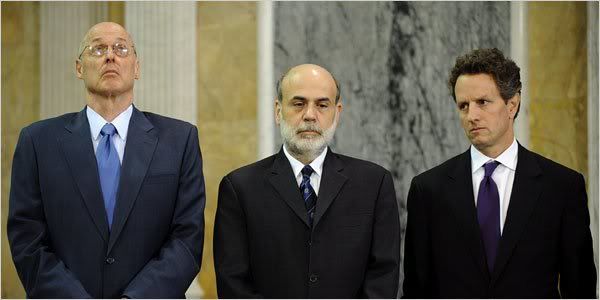Leave it to Paul Krugman to tell the hard truth about what needs to be done in this financial crisis.
[T]he important thing is to bail out the system, not the people who got us into this mess. That means cleaning out the shareholders in failed institutions, making bondholders take a haircut, and canceling the stock options of executives who got rich playing heads I win, tails you lose.
Not that the Fed shall listen, mind you; Ben Bernanke, like Alan Greenspan before him, cares about the laissez-faire swindlers who caused the latest financial meltdown. Factoring in the taxpayers only counts for bailing out the criminals, not bailing out the system the crooks abused in order to flush the economy down the toilet.
Krugman goes on to caution:
According to late reports on Sunday, JPMorgan Chase will buy Bear [Stearns] for a pittance. That’s an O.K. resolution for this case – but not a model for the much bigger bailout to come. Looking ahead, we probably need something similar to the Resolution Trust Corporation, which took over bankrupt savings and loan institutions and sold off their assets to reimburse taxpayers. And we need it quickly: things are falling apart as you read this.
He’s right, of course. Bailing out Bear Stearns might be the smart thing to do as an individual case; for better or worse, that bank is large enough that its failure could — as Krugman suggests — hasten the market panic that would make the Depression we now suffer (the one OpEdNews.com contributor Michael Fox wrote had begun back in November) official. But if it’s used simply as a model for bailing out the rest of the Wall Street rip-off artists, then we taxpayers shall have been forced yet again to foot the bill for the irresponsibility of Wall Street. It’s like a mugging victim being told by a jury that the thug who robbed him wasted the cash on booze and women, so now the victim has to reimburse the thief.
If the Democratic nominee somehow manages to survive the general election in November and become president, he (or she) could do a lot worse than to ask for Bernanke’s resignation as Fed chairman, and offer the job to Professor Krugman.

